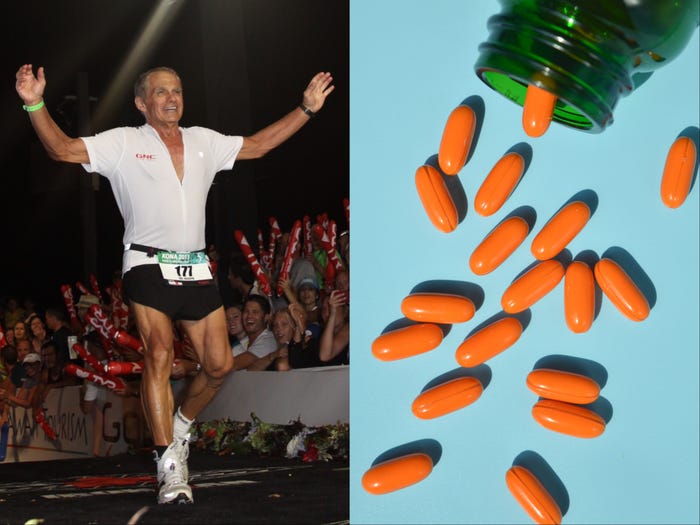An 83-year-old triathlete doctor who transformed his health in his 40s takes these 6 supplements every day

- 83-year-old Dr. Joseph Maroon is a neurosurgeon and triathlete interested in healthy aging.
- He takes supplements every day in the hope that they will improve his longevity.
- These include turmeric, fisetin, resveratrol, and trimethylglycine.
An 83-year-old doctor and triathlete who transformed his health in his 40s shared the six supplements he takes daily with Business Insider.
Most dietitians advise people to get their nutrients from food, but some people in the longevity and antiaging spheres are willing to take low-risk supplements based on emerging evidence that they may benefit our health long-term.
Joseph Maroon, a neurosurgeon at the University of Pittsburgh Medical Center who recently participated in Aviv Clinics’ Global Aging Consortium, is one of them.
Supplements are one part of a health journey that Maroon has been on since the age of 40, when he started running to try to ease the depression he was struggling with following his divorce and the death of his father.
The octogenarian has completed eight Ironman Triathlons since his first when he was 53.
Maroon previously told BI about the key diet principles he follows to maintain his health and his tips for getting fit at any age. Here’s what you need to know about the six supplements Maroon takes.
Fish oil
Fish oil is associated with a range of benefits, from improved heart health and brain function to better mental health, but it’s unclear whether these stem solely from omega-3 or a combination of compounds found in fish.
However, there is some evidence that fish oil supplements may lower the risk of cardiovascular problems or cancer in people who don’t eat fish.
Turmeric
Turmeric has anti-inflammatory properties, meaning it can be useful in managing associated conditions, such as arthritis, allergies, and infections, Mary-Eve Brown, an oncology clinical dietitian at Johns Hopkins Medicine, wrote.
However, it’s unclear whether turmeric can treat specific conditions, according to the National Center for Complementary and Integrative Health. And taking turmeric supplements can increase the risk of developing kidney stones, so it’s best to get turmeric from food, Brown said.
Fisetin
Fisetin is an antioxidant usually found in various fruits and vegetables — such as strawberries, kiwis, tomatoes, and onions — as well as nuts and wine. Fisetin has been shown to have anticarcinogenic, antiaging, and anti-inflammatory properties in lab studies on cells.
However, more research is needed to understand its effects on humans, according to the authors of a 2019 study on the antioxidant, and not many people take it as a supplement. So it’s unclear whether humans would get the same benefits from finestin supplements as they would from food.
Resveratrol
Resveratrol is another antioxidant, found in foods such as red grapes and wine. Limited research done in mice and rats suggests it may prevent or treat cancer and neurodegenerative diseases, but not as much is known about its potential benefits for human health.
Maroon takes it because it stimulates the release of sirtuin, a protein that helps regulate the metabolism and has been associated with an increased lifespan in mice and yeast.
“I’m not encouraging wine drinking. What I’m saying is there are compounds in wine that have health benefits,” he said.
Magnesium
“I work out hard. So I need supplemental magnesium,” Maroon said.
A 2017 review of studies found that as individuals’ physical activity levels increased so did their magnesium requirements, and a few small studies suggested it can improve muscle strength. However, the authors said more research is needed to uncover whether these improvements were caused solely by magnesium.
Most people get more than the recommended amounts of magnesium from their diets and from supplements, according to the US Office of Dietary Supplements.
Trimethylglycine
Trimethylglycine (also known as betaine) is a compound that the body makes itself, which is involved in liver function and cellular reproduction. It’s been approved by the US Food and Drug Administration as a treatment for the overproduction of homocysteine, an amino acid that, in high levels, can increase the risk for dementia, heart disease, and stroke.
It’s also been associated with preventing fatty liver disease, preserving heart function, and protecting the nervous system, according to a 2021 review. But it’s also been associated with increased cholesterol levels in overweight people, and as many studies on it have been done in rats and mice, the review concluded more research into its effects in humans is needed.
.content-lock-lock .hidden {
display: none;
}
